Projectile Motion on an Inclined Plane
Important Questions on Projectile Motion on an Inclined Plane
A man is travelling on a flat car which is moving up a plane inclined at to the horizontal with a speed . He throws a ball towards a stationary hoop located perpendicular to the incline in such a way that the ball moves parallel to the slope of the incline while going through the centre of the hoop. The centre of the hoop is high from the man's hand calculate the time taken (in ) by the ball to reach the hoop in second.
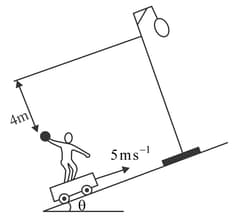
Two parallel straight lines are inclined to the horizontal at an angle A particle is projected from a point midway between them to graze one of the lines and strikes the other at right angles. Show that if is the angle between the direction of projection and either of lines, then .
A stone is projected horizontally from a point , so that it hits the inclined plane perpendicularly. The inclination of the plane with the horizontal is and the point is at a height above the foot of the incline, as shown in the figure. Determine the velocity of the projection.
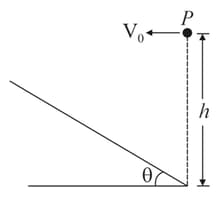
A projectile is fired at an angle with the horizontal. Find the condition under which it lands perpendicular on an inclined plane of inclination as shown in the figure.
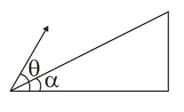
A plane is inclined at an angle with respect to the horizontal. A particle is projected with a speed from the base of the plane making an angle with respect to the plane as shown in the figure. The distance from the base at which the particle hits the plane is close to:
(Take )
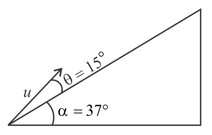
Three stones are projected from the surface of a very long inclined plane with equal speeds and different angles of projection as shown in the figure. The incline makes an angle with horizontal. If and are maximum height attained by and respectively above inclined plane then: (Neglect air friction)
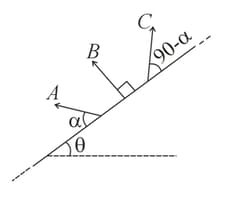
On an inclined plane of inclination a ball is thrown at an angle of with the horizontal from the foot of the incline with a velocity of . If , then the time in which the ball will hit the inclined plane is .
A particle is projected at angle with the incline plane in upward direction with speed . The angle of the inclined plane is given . Then the maximum distance from the inclined plane attained by the particle will be-
Two inclined planes and , having inclinations (with the horizontal) of and , respectively, intersect each other at , as shown in the figure.
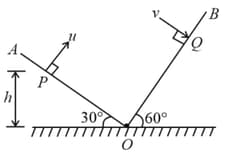
A particle is projected from point with velocity along a direction perpendicular to plane . If the particle strikes plane perpendicularly at , the distance is:
The projected velocity is, , The height of point from the ground is:-
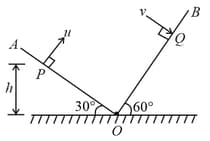
A ball is horizontally projected with a speed from the top of a plane inclined at an angle with the horizontal. How far from the point of projection will the ball strike the plane?
Projected velocity is, , The speed with which the particle strikes the plane is:-
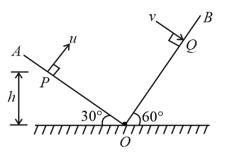
A plane surface is inclined making an angle with the horizontal. From the bottom of this inclined plane, a bullet is fired with velocity . The maximum possible range of the bullet on the inclined plane is
Projected velocity is, , The time of flight from to is :-
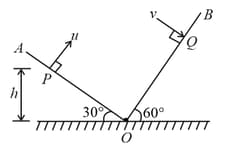
A particle is projected at an angle with an inclined plane making an angle with the horizontal as shown in the figure, speed of the particle is after time find:
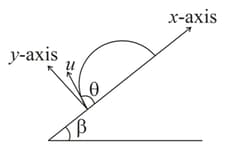
(a) component of acceleration?
(b) component of acceleration?
(c) component of velocity?
(d) component of velocity?
(e) component of displacement?
(f) component of displacement?
(g) component of velocity when the particle is at maximum distance from the inclined plane?

